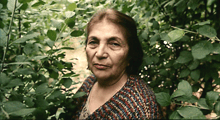An impassive young man, Sadik (Sadik Incesu), bides his time smoking a cigarette before running up the street to greet the postman as he delivers the mail, then crosses the median to a neighborhood café to read the long-awaited results of his final examination over a cup of tea. A filmmaker named Muzzafer (Muzaffer Özdemir) arrives at his parents’ home in the province in order to scout locations for his next film: a personal project that his cheerful, lackadaisical father, Emin (Emin Ceylan) matter-of-factly (and amusingly) describes as the kind of film that never makes any money. Meanwhile, Muzzafer’s mother Fatma (Fatma Ceylan) arrives home with his young cousin, a charming nine-year-old boy with an infectious smile named Ali (Muhammad Zimbaoglu), and curiously proceeds to deposit an unboiled egg into the accommodating boy’s pocket before sending him off to school. Preoccupied with a forthcoming federal land survey that could lead to the re-appropriation of a tract of woodland that adjoins the family farm to a public access road – an area that the stubborn old man had deliberately left underdeveloped during a period of transition from village government in order to retain the tall, sheltering trees that seclude the land from traffic (and perhaps indirectly, the encroachment of civilization) – Emin travels with Muzzafer to visit the disputed area where Muzzafer soon realizes that the tranquil, idyllic woods would make an ideal setting for a scene in his film. Meanwhile, the restless Sadik begins to accompany Muzzafer on his scouting trips, hoping to land an adventurous job with the filmmaker that will allow him to leave the uneventful town and relocate to Istanbul. Upon arriving at the home of a prospective elderly actor, Muzzafar and Sadik begin to film test shots of the subject, but soon find themselves at an impasse with the old man over his commanded salary. With the project financially stalled by the high cost of hiring actors, Muzzafer then turns his attention to his reluctant parents, attempting to sway them into acting in his film for free through the screening of a roughly edited home movie that he has lovingly and tenderly assembled during the course of his previous visits home.
Nuri Bilge Ceylan creates a luminous, sensual, affectionate, and understatedly moving pastoral symphony of family, nature, and life’s interminably evolving cycle in Clouds of May. Unfolding in unhurried (although appropriately paced) near real-time and incorporating environmental sounds that intensates the experience of observation, attention, and texture, the film achieves a graceful purity and awareness of indigenous environment – a “sensitivity to things” – that the Japanese characterize as mono no aware, a concept defined by eighteenth century scholar Motoori Norinaga on the essence of cultural character: the cadence of insects and birds that accompany Emik and Muzzafar’s trip to the disputed farmland; the rolling of tomatoes on the slope of a hill; the clap of thunder and beating of rain that accompanies shots of Fatma and Emin as they humor their son’s incessant home video filming; the oppressive, mechanical drone associated with Sadik’s tediously uneventful factory job; Ali’s amusingly mesmerized obsession with the tinny, digitized melodies produced by a musical watch and subsequently, the curious, multipurpose tool and lighter that plays the opening verses of the Lambada; the unexpected chirping of a hatchling. Inevitably, as his supportive and nurturing family returns to the familiar routine of their seemingly mundane and bucolic life, filmmaker Ceylan, like his alterego Muzzafar, is left to compose an indelible love letter from their profound shared experience, seemingly slowing down the inalterable progress of time to capture a transitory moment of true human connection, enlightenment, and existential grace.
© Acquarello 2004. All rights reserved.
